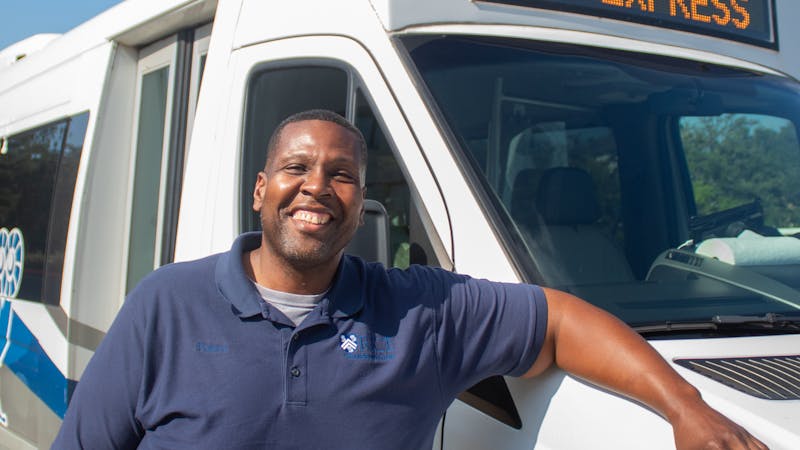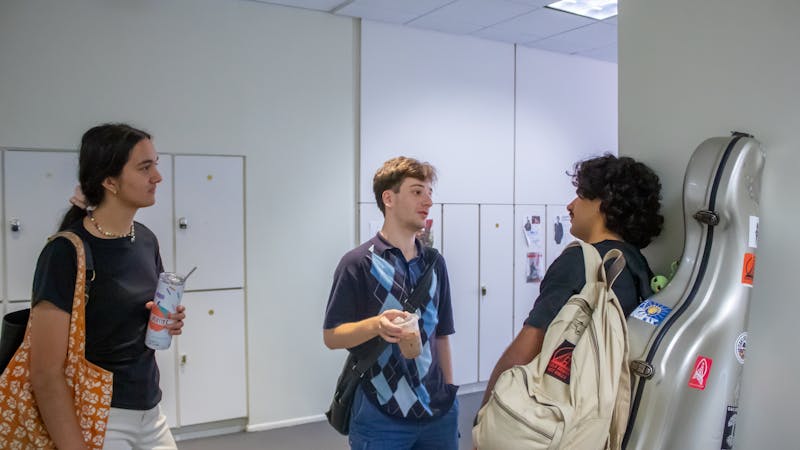GSA and SA work toward greater schoolwide student interaction

Kelton Keck / Thresher
For the past few months, the Graduate Student Association and the Student Association have been discussing how to facilitate a more cohesive Rice student body. A proposed graduate student meal plan at the campus serveries would open undergraduate spaces to graduate students to address potential food insecurity. Another initiative is geared explicitly toward interaction between the two student populations: mentorship-focused meals would bring together undergraduate students who are interested in graduate (or possibly even professional school) with Rice graduate students who are willing to provide mentorship over several meals a semester.
According to Vanuli Arya, chair of the SA Academics Committee, and GSA President Mario Escobar, proposed these mentorship meals to the SA last September. Escobar and Arya both said that the project does not have a set launch date but that the GSA and SA hope to set it in progress this semester or next.
“[Escobar] actually came to one of the SA Senate meetings and had a few things that he wanted to talk about,” Arya, Sid Richardson College sophomore, said. “As it is right now, it’s like undergrads are their own thing, [and] grad students are their own thing. There’s very little opportunity for interaction, apart from personal connections or maybe [connections with] TAs once in a while, but there isn't any kind of social or academic way for them to connect.”
Escobar also said the mentorship initiative has undergone some revisions since its original inception. In line with the SA Academics Committee’s focus on increasing research accessibility this year, one of the plans suggested previously was to pair undergraduate students with graduate students in a research project. However, Escobar said this initiative has been taken up by the Humanities GSA (HGSA), which deemed it more relevant in the humanities fields, where research opportunities may be more difficult for undergraduate students to find.
The GSA is instead focusing on implementing a conversational approach to mentorship, according to Escobar and Arya.
“The end goal is that we'd have a small group of undergraduates per graduate student — let's say two to three undergraduates per graduate student — who could potentially sit down over food and talk about their graduate experience and answer questions in regards to applying or graduate life in general,” Escobar said. “We wanted to also have a rotation modality where if you go to the next meeting, you would get paired with someone else so that you can also learn about other fields or even learn from a different perspective.”
Arya said there was overwhelming support from the SA for this initiative. The Academics Committee has recognized from student surveys that a convenient and consolidated way to find information about research and graduate student life is not readily available to the many interested undergraduate students, who have mostly relied on word-of-mouth in the past, according to Arya.
“[Undergraduate students can ask graduate students at Rice,] ‘What does a day in the graduate student life look like? What is the process of getting to graduate school? What do they do as an undergrad?’” Arya said. “The other part is contact information — getting to network with grad students. What lab do they work in? What faculty members do they work with? It's … word-of-mouth [information] that's accessible to anybody that wants it.”
Siqi Du, vice president of community outreach for the GSA, said said that as a graduate student, she has not had much opportunity to interact with undergraduates and that she would appreciate this initiative.
“My experience interacting with undergraduates is mainly just two things: One is when I am a teaching assistant … and then in lab, I have one undergraduate working with me together on my project. That's a lot more personal, so you will have a lot of discussion, which propels them to join a lab and then interact with graduate students,” Du said. “I feel like that's actually a good way [of encouraging undergraduate-graduate interaction], at least in my department [of biosciences].”
Du also said she believes most graduate students would be interested in mentoring undergraduates, adding, “If there’s food, I feel like most graduate students will be super happy about it.”
Escobar said he wished he had had similar opportunities for interaction with graduate students when he was an undergraduate and that he believes both student populations will benefit from the mentorship initiative. He said it would be good practice for graduate students to help undergraduates as well as a way for them to pay it forward.
“I'm a first-generation student: first one to go to college, first one to get a Ph.D.,” Escobar said. “It seems having that extra perspective, and having that connection with someone who has recently gone through something you're about to do, might really help people either feel more confident about their choice or potentially rethink what they wanna do in the future… I'd say in general, students, and graduate students specifically, are happy to talk about their experience and complain a little bit, but we really feel passionate about what we're studying and what we're doing. If we find other people that have the same passion, we want to help and motivate them.”
More from The Rice Thresher

Over 1,000 students petition against new meal plan
When Konstantin Savvon opened the Housing and Dining email announcing the new unlimited meal plan, he was instantly concerned about the impact on off-campus students like himself.

Rice shuttle bus drivers reflect on changes and connections behind the wheel
Martine Stewart has spent the past year behind the wheel of Rice’s greater loop shuttle, circling the inner campus from the early morning to late afternoon. She said she has come to recognize many of her regular riders – not just their faces, but the exact spots where they wait to be picked up.

Music majors at Rice’s Shepherd School tackle busy schedules, future goals
Cirdan Vonnahme began playing the cello at 4 years old. After winning his first competition at 11 and debuting with an orchestra, he realized he wouldn’t mind playing the cello for life.

Please note All comments are eligible for publication by The Rice Thresher.